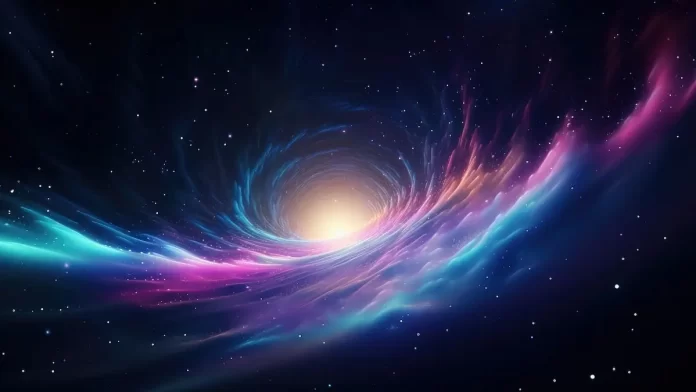Imagine a universe not made of tiny, indivisible particles, but of vibrating strings so infinitesimally small they dwarf even the mightiest atom. This is the realm of string theory, a radical and ambitious scientific proposition that seeks to unify the fundamental forces of nature and rewrite our understanding of the cosmos.
From Point-Like Particles to Vibrant Strings
Traditionally, physics has depicted the universe as a collection of point-like particles – electrons, quarks, and the like.
String theory throws this notion out the window, proposing that these particles are merely different vibrations of the same fundamental entity: the string.
Think of a guitar string – its different plucking patterns produce an array of notes.
Similarly, the way a string vibrates in the higher dimensions of string theory determines its properties, giving rise to the familiar particles we observe.
A Symphony of Dimensions
While we experience our world in three spatial dimensions and one of time, string theory posits the existence of additional, unseen dimensions.
The number of these extra dimensions varies depending on the specific version of string theory, with some models proposing as many as 26!
These dimensions are believed to be curled up on scales much smaller than the Planck length,the theoretical limit of our current measurement capabilities.
Gravity Takes the Stage
One of the biggest challenges in physics is reconciling quantum mechanics, which governs the microscopic world, with general relativity, Einstein’s theory of gravity that reigns supreme on the large scale. String theory offers a potential solution.
In this framework, gravity arises from the way strings interact with each other in the higher dimensions. Just like a massive object warps the fabric of spacetime in general relativity, vibrating strings bend and distort these extra dimensions, creating the gravitational force we experience.
The Quest for the “Theory of Everything”
String theory holds immense promise. It aspires to be the elusive “theory of everything,” a single framework capable of explaining all the fundamental forces and particles in the universe. It also delves into deep questions about the nature of space and time, the origin of the Big Bang, and the possibility of other universes.
However, string theory remains a work in progress. Many of its predictions are currently untestable with our current technology. Additionally, the vast landscape of string theory variants, each with its own set of complexities, makes it challenging to arrive at a definitive picture.
Beyond the Horizon
Despite the challenges, string theory continues to be a vibrant area of research, pushing the boundaries of our understanding of the universe.
New mathematical tools and experimental advancements, such as the search for gravitational waves, hold the potential to shed light on its validity and open doors to groundbreaking discoveries.
Whether or not string theory ultimately becomes the “theory of everything,” its journey has already enriched our understanding of the cosmos.
It has forced us to rethink our most fundamental assumptions about reality and opened our minds to the possibility of a universe far stranger and more wondrous than we could have ever imagined.
Further Exploration:
This article has only scratched the surface of this fascinating and complex topic. If you’d like to delve deeper, here are some resources:
- Books: Brian Greene’s “The Elegant Universe” and Lisa Randall’s “Knocking on Heaven’s Door” offer accessible introductions to string theory.
- Websites: The Perimeter Institute for Theoretical Physics and the Foundational Questions Institute have excellent resources on string theory and other cutting-edge physics topics.
- Documentaries: PBS’s “NOVA: The Elegant Universe” and Morgan Freeman’s “Through the Wormhole” explore string theory and other mind-bending concepts in a visually engaging way.
